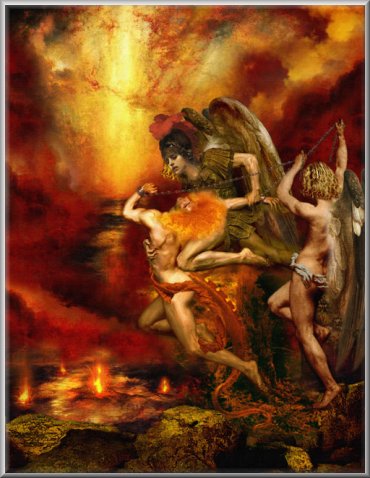
THE DEATH OF THE OLYMPIAN GODS

Into the Lake of Fire by
Howard
David Johnson
The gods are 'immortal', unlike us mere mortals. This is because they have Ichor, not blood, running through their veins. Their diet of ambrosia and nectar also imbues them with immortality. Death is a stranger to them, as they do not experience that biological event which all humans are subject to sooner or later. They are also ageless, meaning that the Greek gods are not prone to the physical decomposition brought upon mortals by factors such as time and age. Therefore, as nobody could kill a Greek god, you could say that they 'faded away' rather than died. All it took was for the faithful to stop believing in them. As soon as the Emperor Julian of Constantinople, the last of the Roman emperors to worship the Olympians, had been killed fighting the Persians in A.D. 363, Zeus was told by the Three Fates that his reign had ended - he and his friends must leave Olympus. Zeus angrily destroyed the palace with a thunderbolt, and they all went off to live among humble country people, hoping for better times. But Christian missionaries chased them out with the sign of the Cross, and turned their temples into churches, which they divided among the leading saints. Mortals were now allowed to reckon by weeks again, as Prometheus the Titan had once taught them. The Olympians were forced to hide in woods and caves, and have not been seen for centuries. However, Echo remains; and so does the narcissus flower, which hangs its head sadly, looking at its reflection in mountain pools; and Iris's rainbow. Moreover, the stars were never given new names by the Christians. You can still see in the night sky the Scorpion that bit Heracles; and Heracles himself; and the Nemean Lion he killed; and Artemis's She-Bear that nursed Atalanta; and Zeus's eagle; and Perseus and Andromeda; and Cepheus and Cassiopeia, Andromeda's parents; and Ariadne's Crown; and the Heavenly Twins; and Cheiron the Centaur, now known as 'The Archer'; and Phrixus's Ram; and the Bull that carried off Europa; and the winged horse Pegasus; and Leda's Swan; and Orpheus's Lyre; and the stern of the Argo; and Orion the Hunter, with his belt and sword; and many other memorials of the Olympians' ancient and savage reign. |
Above info courtesy of
Robert Graves'
Greek Gods and Heroes